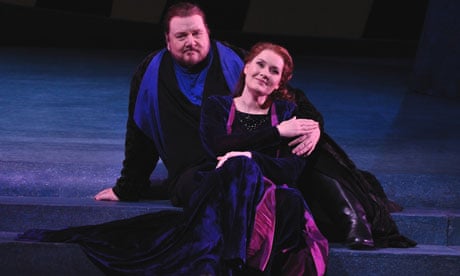The classic, sculptural simplicity of Welsh National Opera's 1993 production of Wagner's masterpiece has proved enduring. Director and designer Yannis Kokkos treats it as Greek tragedy, and his creation of a frame within the proscenium gives every big moment and strategic action its optimum dramatic context. What he couldn't have predicted was that Isolde's Titian tresses today look disconcertingly like Rebekah Brooks-style locks. Fortunately, Ann Petersen's portrayal of the Irish princess was so strong as to command the attention: a wonderful voice, accurate and wholly flexible with a comparable physical litheness, and radiating emotional intensity throughout. She was matched by the impeccable Brangaene of Susan Bickley, and between them they stole the show.
Ben Heppner's Tristan was uneven. If there were occasional glimpses of the golden era of his signature role, they were tantalisingly few, and while his tenderness towards Isolde was manifest – this revival under Peter Watson was more touchy-feely than previously – Heppner's vocal heft was too often used to paper over cracks. Ironically, he even caused an audible crack in the set under him while writhing in death. Phillip Joll's Kurwenal was big-voiced but sadly indeterminate of pitch. Matthew Best's exemplary King Marke towered over them, a figure of nobly dignified bearing, focused sound and elegant phrasing.
WNO's music director, Lothar Koenigs, elicited some notable playing from the orchestra. His instinct for the cut-and-thrust urgency as though in pursuit of the climatic moments was paramount, yet the ecstatic beauty of Wagner's score eluded him, its glorious harmonies glossed over. Nevertheless, the expressivity of Petersen's Isolde and Bickley's Brangaene, and that of Best, too, are as fine as anything you'll hear – redeeming, if not quite obliterating, the elements that fell short of the ideal.

Comments (…)
Sign in or create your Guardian account to join the discussion